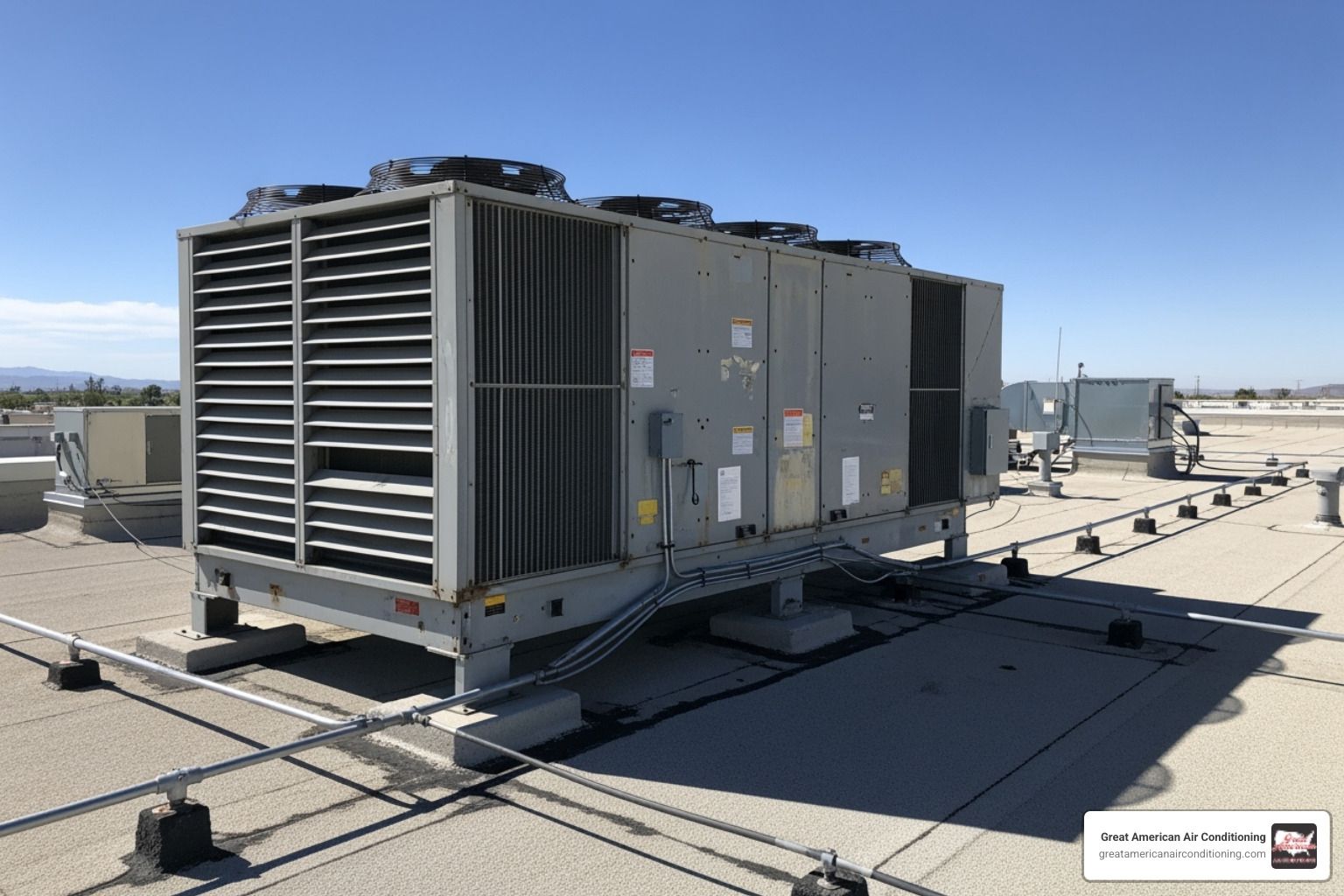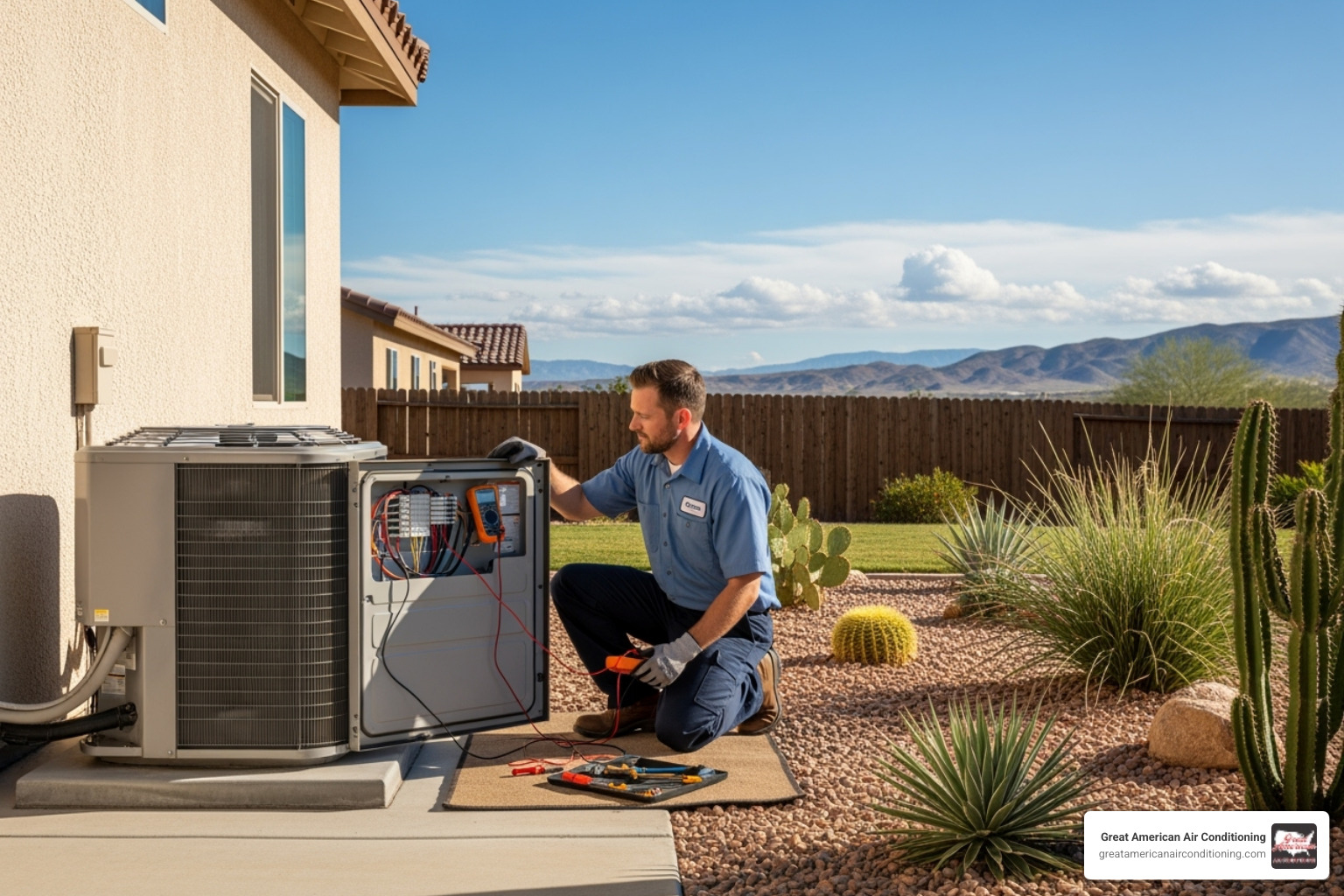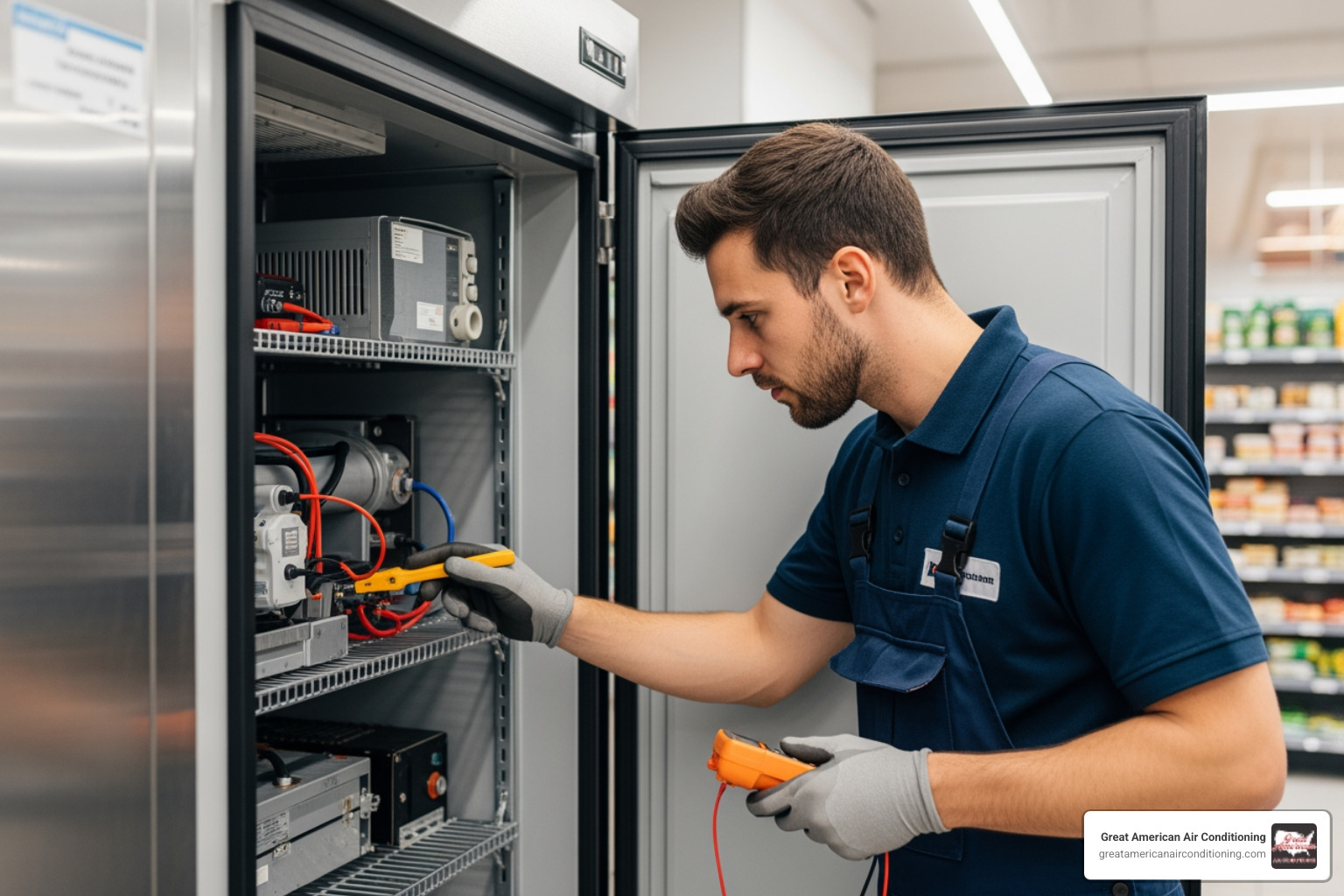Is Your Heat Pump Crying for Help? Telltale Signs of Trouble
Heat pump repair in Mesa is essential for year-round comfort and manageable energy bills in Arizona's desert environment. In a city where summer highs soar past 115°F and winter nights dip into the 40s, your heat pump works continuously—so small issues can quickly become big problems.
Quick Answer: Signs You Need Heat Pump Repair
- Uneven heating or cooling throughout your space
- Strange noises like grinding, squealing, or hissing
- Sudden spikes in your energy bills
- Short-cycling (frequent on/off cycles)
- Reduced airflow from vents
- Unusual odors from the system
- System won't turn on or stops working entirely
Heat pumps are among the most cost-effective HVAC systems because they transfer heat rather than generating it. When maintained and promptly repaired, they can stay efficient and dependable for 10–20 years in Arizona. If you want a quick primer on the technology, see how a heat pump moves heat for heating and cooling.
Catching issues early protects efficiency, prevents emergency breakdowns, and keeps your space comfortable—no matter what Mesa’s climate throws at you.
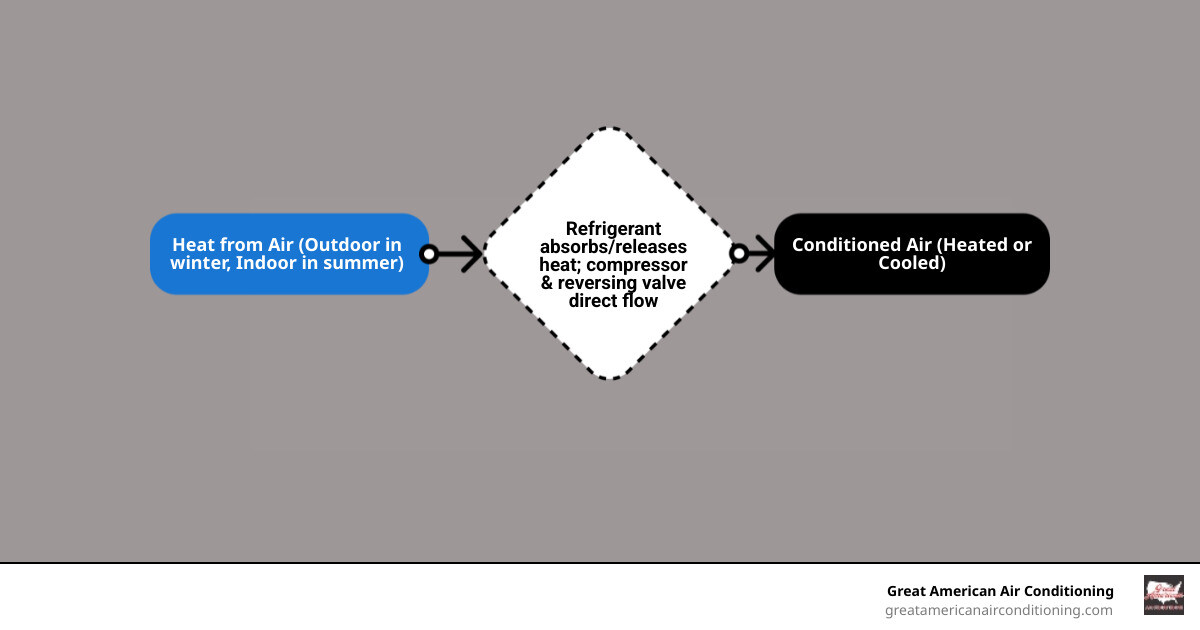
Is Your Heat Pump Crying for Help? Telltale Signs of Trouble
Your heat pump should run quietly and consistently. If comfort slips or operating sounds change, it’s time to take a closer look.

- Uneven Heating or Cooling: Can indicate duct issues, low refrigerant, or a struggling compressor.
- Strange Noises: Grinding/squealing (motor bearings), hissing (possible refrigerant leak), persistent clicking (compressor/electrical).
- Sudden Spikes in Energy Bills: Often due to restricted airflow or refrigerant problems.
- Short-Cycling: Rapid on/off cycles from dirty filters, wrong sizing, or electrical issues.
- Reduced Airflow: Blower motor problems, clogged filters, or blocked ductwork.
- Unpleasant Odors: Musty (mold), burning (electrical—address immediately).
- Won’t Turn On: Professional diagnosis is needed.
What to Do When Your Heat Pump Fails Unexpectedly
Before calling for service, try these quick checks:
- Check Thermostat Settings: Confirm the correct mode and temperature.
- Inspect Circuit Breakers: Reset any tripped breakers for indoor and outdoor units.
- Ensure Vents Are Unblocked: Clear furniture or boxes from supply/return vents.
- Document Symptoms: Note sounds, smells, and when issues started.
- Call for Professional Service: Complex systems need expert care. For commercial needs: learn more about our commercial HVAC services.
The Process of Professional Heat Pump Repair in Mesa
Mesa’s climate puts year-round stress on heat pumps, so we focus on accurate diagnosis and lasting fixes—not band-aid repairs.
Our repair process is straightforward and transparent:
- Diagnostic Evaluation: NATE-certified technicians listen to your observations and test pressures, electrical connections, motors, and controls on indoor/outdoor units.
- Root Cause Identification: We address the real issue—common in Arizona are refrigerant, electrical, or control faults.
- Clear Explanations and Repair: We explain options in plain English and often complete repairs the same day.
- System Testing and Optimization: We verify temperature differentials, airflow, and overall performance for Mesa’s conditions.
For comprehensive support, from minor adjustments to major component replacements, our team has the expertise Mesa's climate demands. More info about heat pump repair services
Common Issues Requiring Heat Pump Repair in Mesa
The combination of extreme heat, dust, and year-round operation often leads to:
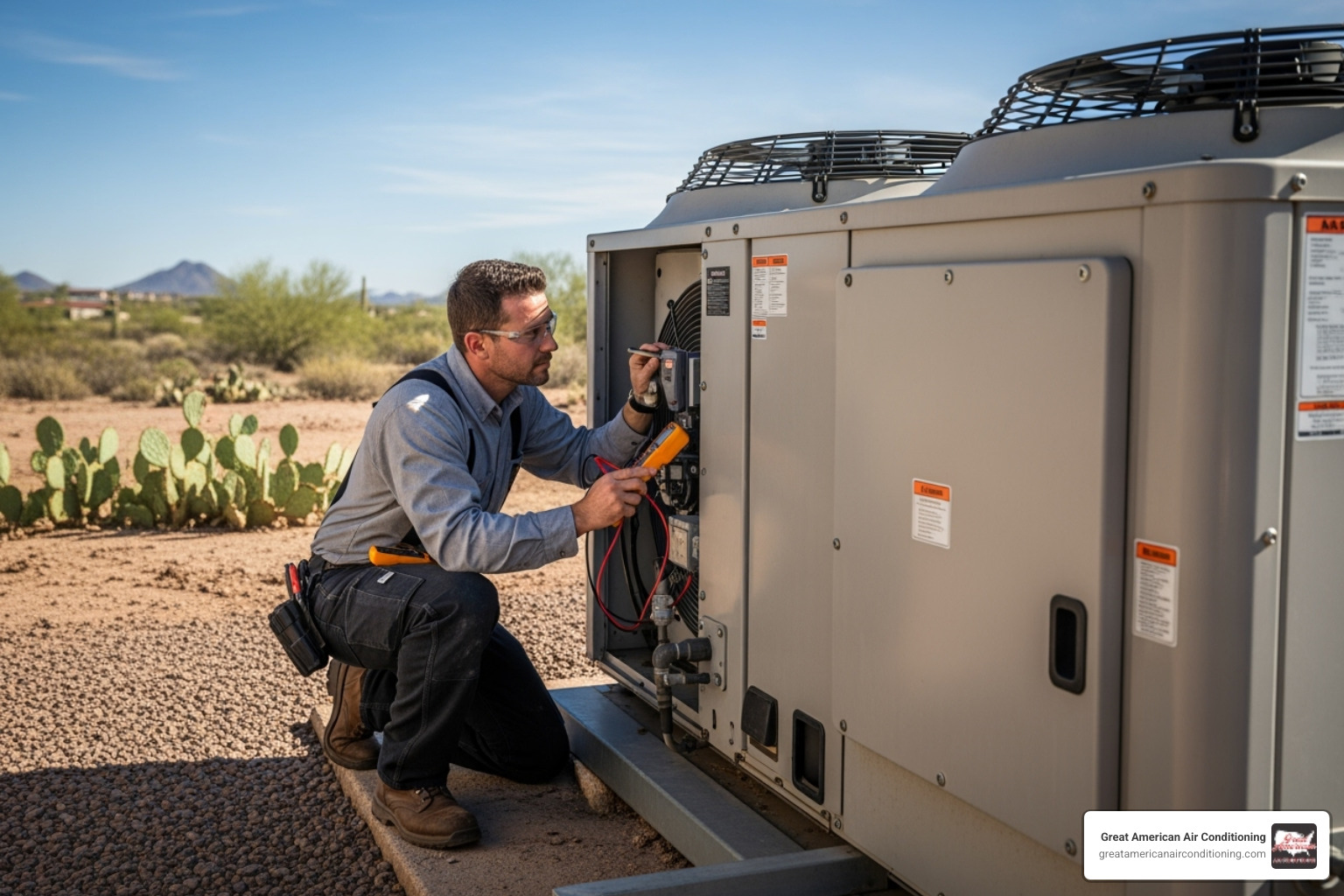
- Refrigerant Leaks: Reduced capacity, hissing, or ice on coils.
- Electrical Failures: Stressed capacitors/contactors and heat-weakened wiring.
- Worn-Out Compressors: Noises, hard starts, or system shutdowns.
- Thermostat Malfunctions: Incorrect readings or unresponsive controls.
- Clogged Filters: Dusty air restricts airflow and raises energy use.
- Outdoor Unit Ice Formation: Defrost or refrigerant issues in cooler months.
The Power of Prevention: Commercial Heat Pump Maintenance
Preventative maintenance minimizes downtime and energy waste. We recommend twice-yearly visits:
- Spring (Pre-Summer Cooling Check): Clean coils, verify refrigerant, inspect electrical, test components for 115°F+ days.
- Fall (Pre-Winter Heating Check): Verify defrost cycle and heating performance for cool desert nights.
A well-maintained system runs more efficiently and lasts longer. More info about HVAC maintenance plans
The Big Decision: Repairing vs. Replacing Your Heat Pump
When facing a significant heat pump repair Mesa estimate, weigh age, repair cost, frequency of breakdowns, and efficiency. The common “50% rule” helps: if a repair exceeds half the cost of a new unit—and the system is past mid-life—replacement often makes more sense.
FactorConsider Repairing If...Consider Replacing If...System AgeThe unit is less than 10 years old.The unit is over 10-15 years old.Repair CostThe cost is less than 50% of a new unit.The cost exceeds 50% of a new unit (the "50% rule").Repair FrequencyThis is the first or second major repair.You've had multiple repairs in the last two years.Energy BillsBills have been stable.Bills are steadily increasing despite usage.
New systems deliver higher SEER/HSPF ratings than older units, which can significantly cut bills in Mesa’s near year-round operating conditions.
When Replacement is the Smart Move: Benefits of Upgrading
- Lower Utility Bills: High-efficiency systems can reduce costs by 30–40% or more.
- Improved Reliability: New equipment plus manufacturer warranties.
- Advanced Features: Variable-speed operation, smart thermostat integration, and zoning options.
- Better Indoor Air Quality: Improved filtration and humidity control.
- Reduced Carbon Footprint: Uses less electricity and modern refrigerants.
If you're ready to explore replacement options, we're here to guide you. More info about heat pump replacement
Choosing the Right System for Mesa's Climate
- Air-Source Heat Pumps: Ideal for hot summers and mild winters.
- Rooftop Packaged Units: Space-saving and robust for commercial use.
- Ductless Mini-Splits: Excellent for zoning and hard-to-condition areas.
- Correct Sizing: Load calculations prevent short-cycling or underperformance.
- High-Efficiency Models: Higher upfront cost, faster payback in Mesa’s climate.
Is Your Heat Pump Crying for Help? Telltale Signs of Trouble
Running hot and cold, odd sounds, rising bills, short-cycling, weak airflow, or new odors are all early warnings your system needs attention. Catching issues now helps avoid emergency downtime and protects your budget. If your unit won’t start or shuts off unexpectedly, schedule service right away—DIY fixes on commercial systems can cause further damage or safety risks.
What you can do first: confirm thermostat settings, check breakers, clear supply/return vents, and jot down symptoms. Then call the pros for a safe, lasting fix. For commercial support, we’re ready to help: More info about commercial HVAC services
The Process of Professional Heat Pump Repair in Mesa
Mesa’s year-round demands require accurate diagnosis and durable repairs. We start by listening to your observations, then test refrigerant pressures, electrical components, motors, and controls. Once we identify the true cause, we explain your options and complete most repairs the same day, followed by system verification to ensure proper temperatures and airflow.
For everything from electrical faults to refrigerant issues and component replacements, count on our certified team. More info about heat pump repair services
Common Issues Requiring Heat Pump Repair in Mesa
Frequent culprits include refrigerant leaks, stressed electrical parts, worn compressors, faulty thermostats, clogged filters, and occasional outdoor coil icing during cool snaps.
The Power of Prevention: Commercial Heat Pump Maintenance
Twice-yearly service (spring and fall) helps your system run efficiently through extreme heat and cooler nights, while extending equipment life.
The Big Decision: Repairing vs. Replacing Your Heat Pump
Consider age, repair history, efficiency, and the 50% rule when choosing between repair and replacement. Younger systems with isolated issues usually merit repair; older units with repeated breakdowns or costly fixes often justify upgrading to a higher-efficiency model that lowers monthly operating costs.
New systems add reliability, smarter controls, and better comfort—benefits that matter in Mesa’s climate. We’ll outline options and costs so you can decide with confidence. More info about heat pump replacement
Choosing the Right System for Mesa's Climate
Air-source heat pumps, rooftop packaged units, and ductless mini-splits are proven solutions here. Proper sizing and high-efficiency selections deliver the best results year-round.
Is Your Heat Pump Crying for Help? Telltale Signs of Trouble
Picture this: It's a blistering Mesa afternoon, temperatures pushing past 110°F, and your customers are fanning themselves inside your business. Or imagine a surprisingly chilly winter morning when your employees show up bundled in coats—indoors. These aren't just uncomfortable moments; they're scenarios that can seriously disrupt your operations, hurt productivity, and even tarnish your hard-earned reputation.
Your heat pump is the quiet champion working behind the scenes, tirelessly battling Mesa's extreme climate swings to keep everyone comfortable. But like any hardworking piece of equipment, it can't do its job forever without a little TLC. The key to avoiding a complete meltdown (or freeze-up) is catching the warning signs early. When you know what to watch for, you can stop small hiccups from turning into expensive emergencies that shut down your business.
So what exactly should you be listening and looking for? Your heat pump actually "talks" to you through various symptoms when something's wrong. Uneven heating or cooling throughout your space is often the first clue—when one room feels like the Arctic while another resembles the Sahara, your system is struggling to distribute air properly. This temperature inconsistency usually points to problems with your ductwork, low refrigerant levels, or even a failing compressor.
Strange noises are another dead giveaway that something's amiss. Heat pumps should hum along quietly in the background. When you start hearing grinding, squealing, hissing, buzzing, or clicking, pay attention. Grinding or squealing typically means motor bearings are wearing out, while a hissing sound often signals a refrigerant leak. Ticking noises? That could be your compressor crying for help. Any persistent or unusually loud sounds deserve a professional inspection.
Here's something that'll get your attention: a sudden spike in your energy bills. One of the biggest selling points of heat pumps is their efficiency—they can slash your heating and cooling costs by around 40 percent! But when your utility bills jump without any increase in usage, your heat pump is working overtime to maintain comfortable temperatures. This efficiency drop is a clear red flag, often caused by a clogged filter or refrigerant leak.
System short-cycling is particularly concerning. When your heat pump keeps turning on and off in rapid succession, it's not just annoying—it's burning through energy and putting serious stress on every component, which can dramatically shorten your system's lifespan. Short-cycling happens for several reasons: an incorrectly sized unit, a dirty air filter, electrical problems, or thermostat malfunctions.
If you notice reduced airflow from your vents, or worse, no airflow at all, something's blocking the path. This could be a failing blower motor, severely clogged filters, or obstructions in your ductwork. Whatever the cause, it directly impacts your comfort and prevents your system from doing its job.
Unusual odors are never a good sign. A properly functioning heat pump shouldn't smell like anything. Musty odors suggest mold or mildew growing in your ductwork or on the evaporator coil—a health concern as well as a comfort issue. A burning smell? That's potentially an electrical problem requiring immediate attention. Don't ignore strange smells; they can indicate anything from refrigerant leaks to dangerous electrical issues.
And of course, the most obvious sign: your system won't turn on or stops working entirely. When your heat pump refuses to start or shuts down mid-operation, it's definitely time to bring in the professionals for heat pump repair Mesa.
What to Do When Your Heat Pump Fails Unexpectedly
A sudden heat pump failure during Mesa's peak summer or an unexpectedly cold winter night can feel like a full-blown emergency. Before you panic, though, take a breath. There are several quick checks you can perform that might either solve the problem or at least give our technicians valuable information when they arrive.
Start with your thermostat settings. It sounds almost too simple, but you'd be surprised how often this is the culprit. Make sure it's set to the right mode—"Cool" for summer, "Heat" for winter—and check the temperature setting. Also look at whether it's on "Auto" or "On." For heat pumps, we generally recommend avoiding "Auto" mode since it can waste energy by switching between heating and cooling at inappropriate times. The "On" setting forces the system to run constantly regardless of outdoor conditions, which isn't ideal either.
Check your circuit breakers next. Head to your electrical panel and look for any tripped breakers connected to your heat pump. You'll have circuits for both the indoor and outdoor units, so check them all. If you find a tripped breaker, reset it and see if that solves the problem.
Make sure your vents aren't blocked. Walk around and verify that all supply and return vents are clear of furniture, boxes, storage items, or any other obstructions. Blocked vents restrict airflow, forcing your system to work harder and potentially overheat. This simple fix can sometimes restore normal operation.
Document everything you're experiencing. Jot down any unusual sounds, smells, or visual clues. When did the problem start? What's happening (or not happening)? Is the outdoor unit running? Are you getting any airflow at all? This information helps our technicians diagnose the issue more quickly and accurately.
Call for professional service if these basic steps don't resolve the issue. Here's the thing: commercial heat pumps are incredibly complex systems with electrical components, refrigerant lines, compressors, and sophisticated controls. Attempting DIY repairs can lead to additional damage, void your warranty, and create serious safety hazards. For comprehensive support with all your commercial HVAC needs, we're always here to help. More info about commercial HVAC services
The Process of Professional Heat Pump Repair in Mesa
Our Mesa-focused repair approach: listen, test, diagnose the root cause, fix with quality parts, and verify performance for your conditions. Common Mesa issues include refrigerant leaks, electrical failures, worn compressors, thermostat faults, clogged filters, and occasional coil icing in cool weather. Get reliable, same-day solutions when possible. More info about heat pump repair services
The Power of Prevention: Commercial Heat Pump Maintenance
Spring pre-cooling and fall pre-heating checks help avoid downtime, cut energy costs, and extend equipment life.
The Big Decision: Repairing vs. Replacing Your Heat Pump
Use system age, repair frequency, rising energy costs, and the 50% rule to guide your choice. In many cases, an upgrade pays back quickly in Mesa through lower utility bills and improved reliability. When you’re ready to compare options, we’ll help you select the right high-efficiency system and size it correctly. More info about heat pump replacement
Blogs post
Customer Testimonials
Our customers consistently share positive testimonials, praising our reliable service, expert technicians, and commitment to their comfort.
Ready to Transform Your Home?
Discover our exceptional home services tailored to meet your needs and enhance your living space.
.avif)





